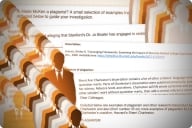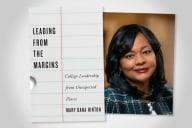You have /5 articles left.
Sign up for a free account or log in.
Many experts say that the United States can only truly see gains in the percentages of adults who have a college degree if colleges and universities get better at teaching students who arrived on campus unprepared for college-level work. But many professors find themselves frustrated by teaching such students -- and many of the students drop out. Kathleen F. Gabriel's new book is designed to help such faculty members and, ultimately, their students. Teaching Unprepared Students: Strategies for Promoting Success and Retention in Higher Education was just published by Stylus. In an e-mail interview, Gabriel, a professor of education at California State University at Chico, explained some of the key points of the book.
Q: Many professors would love to avoid this subject, saying that high schools need to do a better job, or remedial classes should provide the solution. You write that professors need to be engaged on this issue. Why?
A: I certainly agree that high schools need to do a better job of preparing their students for college level curriculums. However, the reality is that right now we have freshmen and transfer students who are not prepared, but who are enrolled in our classes and want to learn. Many colleges do have some remedial courses, summer bridge programs, and tutoring centers to assist at-risk and unprepared students and attempt to increase their chances of being successful. Still, those who have historically been underserved -- including those who are the first in their family to be able to go to college -- have the lowest graduation rate. Furthermore, we should not turn our backs on students who were not adequately prepared for college in our current public high school system regardless of the reasons.
If we are sincere about giving at-risk students who are enrolled in our classes a real chance of success, then professors must also be engaged and not just refer these students to academic support or tutoring centers. If we, the professors, are not reaching out to at-risk or unprepared students who are enrolled in our classes, then we are simply setting these students up for failure and, at the same time, only pretending our colleges have somehow fulfilled a moral obligation of providing opportunities to our diverse population in today's society.
Furthermore, several studies have proven that professors do make a difference in their students' intellectual development. Unprepared students can achieve an increased level of performance with the encouragement and support of their professors.
Q: Your work stresses the importance of expectations and the way a course starts off. What's the key to reaching students early?
A: I give several suggestions in my book, but I would say that there are three very important things professors can do on the first day and during first week of classes. First, on the first day of class, professors should have their students participate in an engaging, yet educational, activity. The activity should be one where professors and students are learning information about the people enrolled in the class. It is very important to start learning the students' names and allow students to meet each other. Learning students' names is key to creating a community atmosphere for a class.
Second, require students to be in class from the first day, which means dropping students who are absent on the first day and not allowing students to add unless they have attended the first class since it is on the first day that professors should hand out and review the course syllabus. On the syllabus, professors can include a "welcoming" statement, along with course policies, expectations, reading assignments, grading policies, etc. (A syllabus checklist is provided in my book to assist professors along with a discussion for each of these subtopics.) Grading policies should include a variety of ways that students can demonstrate what they are learning as well as an accompanying rubrics for all assignments.
Third, on the first day, have students fill out an information card that not only includes their contact information, but also has them write why they signed up for the class and lists their personal goals for the course. By reaching out to students and asking them to provide information about themselves, professors can begin creating a positive and inviting atmosphere. (Additional engaging activities that can be used early in the semester are discussed in my book.)
Q: What are the common mistakes professors make when confronted with students who aren't prepared?
A: There are many different ways to help students step-up to higher standards and make significant gains in their academic performance. Teaching Unprepared Students is not about lowering standards; it is about how professors can use different techniques that will help student grow and improve and how to help the students learn. The biggest mistake a professor can make is to provide a "false" sense of progress and success to a student who has not done the work or complied with the expectations that are outlined on syllabi. I have seen this happen primarily in three different scenarios.
First, it is a mistake to excuse an unprepared student from a class assignment or grade his/her work differently from other students in the class. Professors must hold all of their students to a fair and equal grading system. There should never be a special deal, or "secret" extra credit after the fact. Any kind of extra credit or revision that is offered should be available to every single person enrolled in the class -- and announced publicly in class and well before the last few weeks of a semester -- or after classes have ended. Not holding all students to the same standards and requirements is unfair to everyone -- especially the unprepared students.
A second mistake is to treat the unprepared students with pity, disrespect, or considering them academically incapable of improving. Regardless of a students' academic history, professors should maintain high levels of expectations for unprepared students since most students tend to respond to how they are treated and the expectations that are set for them. It is a mistake not to let students know that you expect their best effort, hard work, extra time spent on assignments, and make a commitment to the class if they are behind.
A third mistake is failing to provide students with detailed rubrics for all assignments, especially written ones. We need to provide the opportunity for undergraduate students to revise their written assignments. Unless it is impossible to do, I highly recommend this practice with specific guidelines.
Q: What kind of out-of-classroom support do colleges need to provide to reinforce what professors are doing in class?
A: There are many ways colleges can support their faculty. Colleges should have faculty development programs for faculty, and second, colleges need to have academic support centers available for the students. Faculty development programs can provide pedagogical workshops and support as professors develop learner-centered teaching methods to engage students, broaden their use of assessments and rubrics to improve learning, develop and improve clear and thorough syllabi, incorporate universal learning design techniques, etc.
Professors are also supported when colleges have academic support for students. Having tutoring centers, writing labs, and supplement instruction programs for targeted classes can help any students who are struggling and seeking support.
Q: Many fear that too much emphasis on the poorly prepared will detract from the experience of those who are prepared. How would you respond?
A: The teaching strategies presented in my book are ones that support the Seven Principles of Good Practice in Undergraduate Education, by Chickering and Gamson, which are positive and beneficial for all students whether they are highly prepared for college or unprepared. In addition, several research studies have found that when we engage all students in “educationally purposeful activities” then all students can benefit. In one study, "Connecting the Dots," by Kuh et. al. (2005), they report that the traditionally underserved students made greater gains but did not do so at the expense of other more prepared students. Using learner-centered teaching practices and other techniques that I discuss in my book does not required faculty to lower their expectations or do anything that would detract from more prepared students.








